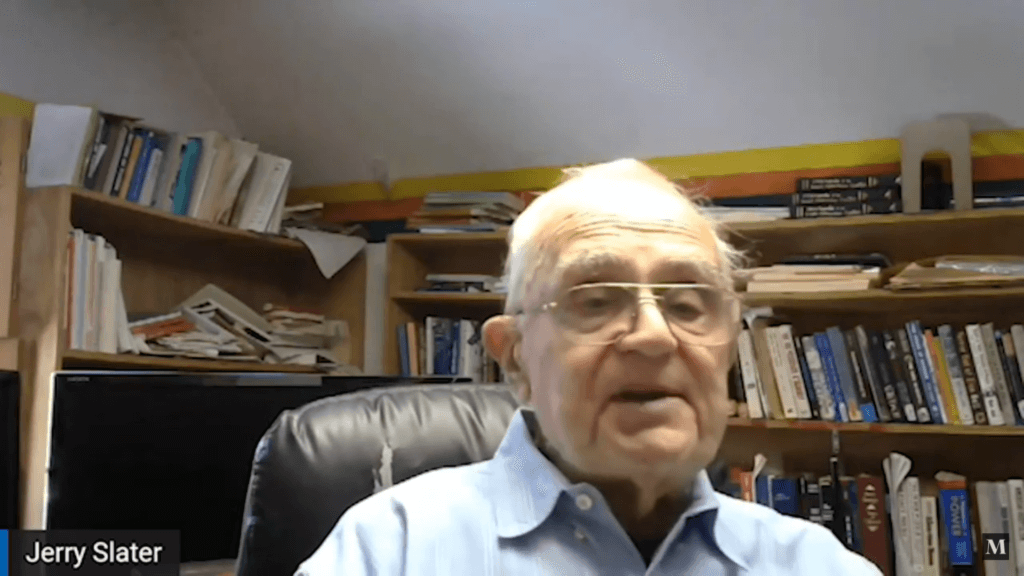We have been highlighting the importance of Jerome Slater’s new book that reveals a long pattern of Israeli rejection of the two-state solution. The idea that Israel simply wants peace is a myth purveyed to western audiences to cloak territorial expansion, Slater shows. Titled, “Mythologies Without End: The U.S., Israel, and the Arab-Israeli Conflict, 1917-2020“, this big book is a go-to source on such questions as the Israeli offer at Camp David under Clinton and on the geopolitics of the conflict, especially the Soviet Union role in the 70s.
I interviewed Slater last month and pressed him about a number of famous historical incidents of Israeli intransigence, and also asked why he regards the attitudes of the American Jewish community as key to the conflict.
Below are some excerpts of our discussion. But have a listen (and don’t mind the echo, it’s only when I’m talking).
“The main mythology that I’m examining,” Slater says, “is I quote the famous Abba Eban quote which goes back to the early 1970s, the Arabs never miss an opportunity to miss an opportunity. My argument is that that is almost precisely wrong. There have been many opportunities, even before the 1948 war, in which the main Arab states did not want to get into a war with Israel, and they put forward compromises… [on] territorial issues, and the Israelis were not interested in that…
“The central mythology is lost opportunities for peace.”
Slater chronicles a forgotten history of peace initiatives. For instance, the Fahd plan put forward by the Saudi Crown Prince in 1981, preceded the Arab Peace Initiative, and called for a normalization of relations with Israel if it returned to the ’67 lines and allowed a Palestinian state to be created– and Fahd plan supporters included Iran! But Slater demonstrates that without American pressure Israel would make no territorial concessions and– it didn’t make any concessions.
“Even in 1948 the Egyptians were reluctant to get into the war,” he says. “They would have stayed out if Israel had made minor concessions. There were a number of overtures for a political settlement after that and Israel rejected them, and wouldn’t even send representatives… They [Arab states] met a stone wall… The Israelis were not willing to negotiate… They weren’t even prepared to negotiate till Sadat came to Israel…
“The conflict with Syria [in ’67] was eminently avoidable. Israel wanted to expand into southern Syria. They could have had peace if they had been willing to give up their territorial aspirations in southern Syria. [Syrian President] Hafez al-Assad was willing, anxious to make an agreement.”
Another fascination of the book is about American pressure. In 1992, President George H.W. Bush tilted Israeli politics. The Israeli public perceived that Bush preferred Rabin to Shamir, and they went with Rabin.
“Bush did more than urge… He was one of the few who imposed economic sanctions [on settlement activity]…and that was certainly symbolically powerful,” Slater says. “He wanted to defeat Shamir, there was no question about it, they let that be known to the Israeli public.”
Could Joe Biden do the same with Netanyahu in the March election
“The circumstances have changed such that … I don’t think Biden is going to do it and I don’t think it would work if he did. The Israelis…have become so rightwing that they are much less willing even in principle to agree to a two state settlement…. I don’t think pressures like that are going to be forthcoming nor they are going to work.”
Israel has gotten U.S. presidents to back down again and again over settlements.
“[Israeli leaders] think they have a vital interest in preventing a two state settlement. I don’t think they’re right, but Obama… was stonewalled and he backed down.”
Reagan was opposed to the settlements, and he backed down. Biden was also opposed to settlements, and he backed down.
Another revelation is Slater’s discussion of the former Soviet Union’s influence in the Middle East. Israel offered itself as the U.S. aircraft carrier in the Cold War, but Slater says the Soviets wouldn’t have been in the Middle East if the U.S. hadn’t supported Israel so vigorously. That American bias left Arab states no choice but to align with the Soviet pole; and the U.S. thwarted reasonable Soviet initiatives for peace aimed at lowering the temperature.
“It’s an easy case to make that it was the United States, specifically Nixon and Kissinger… who sabotaged, and I think that’s the only reasonable word, deceitfully, Soviet inititatives that I think were very fair for a two state settlement guaranteed by the super powers,” Slater says. “Many members of the State Department and foreign policy establishment thought that the Soviet initiative made a lot of sense.”
But if the U.S. had joined with the Soviet Union in seeking to impose such a deal, this would constitute a recognition by the U.S. “that the Soviet Union had a legitimate interest… an undeniable central role in the Middle East,” and Kissinger refused to acknowledge as much. “If Kissinger had been prepared to accept the Soviet role, there would have been a comprehensive agreement in the 1970s,” Slater says.
Even Nixon was tempted to accept the Soviet role. “But Kissinger talked him out of it. Kissinger was simply deceitful. He simply denied the public record which showed that the Soviet proposal was the same basic two state settlement with guarantees for Israeli existence as everyone else was making,” Slater says.
Slater says the Soviets sought to counterbalance the US influence in the Middle East throughout the 70s and 80s because they were afraid that a Middle East conflict could detonate a global superpower conflict.
“The cold war record of the Soviets has been widely misunderstood,” Slater says. After the ’67 and ’73 wars, the Soviets were worried about war. “The Soviets did not want any part of that, correctly so.” That’s why they tried to forge a peace deal that the U.S. ignored but that “would have been in America’s real interests and the interests of peace,” Slater says.
Slater also exposes Yitzhak Rabin, the liberal Zionist hero. Settlements increased under Rabin in the 90s more than they had under his Likud predecessor, Yitzhak Shamir, and Rabin was never interested in a Palestinian state, but an “entity.”
“He was a hawk but he was changing [before he died],” Slater says. “In order to sell the Oslo accords to the Knesset, Rabin didn’t exclude a Palestinian state, but he said, I see it more as an entity than a state. And he made other qualifications.” Even in that very minimal form, Oslo passed the Knesset by two votes, which shows how rightwing the Knesset was even in the 90s.
Speaking personally, Slater says that as a liberal Zionist he accepted Israel’s mythologies for many years and actually volunteered, as a former Navy officer, to help Israel out in the ’67 war.
“I didn’t know that there was any other legitimate position to be, than a wholehearted supporter of Israel and its military victories in 1948 and 1967,” Slater says. “All that was based on the premise that Israel wanted peace and was prepared to make compromises, had agreed to the UN Partition [of 1947] and the Palestinians hadn’t, which was a large part mythology.
“All the mythologies– I believed, I accepted– they weren’t really being challenged much. Even Noam Chomsky has said that in 1967 he was afraid… I felt the same way.”
Slater changed when he began looking into the history as an academic in the 1980s and went down a path many Jews have gone down since.
“I began to have serious doubts about whether what was widely accepted as true was really true.”
Slater’s big book includes an appeal to the American Jewish community. It needs to dispense with these mythologies and accept the truth of Israel’s conduct or there won’t be progress toward peace.
We talked about Zionism as a Jewish ideology. Slater said, “The other main mythology that I examine is the Zionist argument that not only must there be a Jewish state, which I accept with some qualifications– certainly in the aftermath of the Holocaust and given the history of murderous antisemitism, there was a very good argument for a Jewish state. But the issue is, where can you put it. I examine all the arguments that have been made by Zionists and Zionist supporters for the need for a Jewish state in Palestine, and most of those arguments are very poor frankly, they don’t stand up to any kind of serious examination.”
I asked him about his feelings about Israel today.
“I’m still a Zionist, but I’m on the extreme leftwing of Zionism… You cannot say definitively there’s no longer any need for a Jewish state…
“[But] I am gravely disillusioned with Israel… I took seriously the idea [of Jews as]… a light unto the nations… At one level that seems preposterously parochial… but it didn’t seem preposterous to people at the time, even to much of the non-Jewish world….
“Israel was not doing that, it was doing the opposite. There was a vast gap between how we Jews saw ourselves, not without reason [and Israel’s behavior].”
The discourse of Israel in the west is changing forever, he says. For a time Israel was regarded as beyond criticism. “It was adored in the west,” Slater says. “It was only after that promise became empty, which is the correct word now, that there came strong criticism of Israel in the west.”



I have admired Jerry Slater since I first encountered his former website. But it must be recognized that he’s stuck in the liberal Zionist/Oslo Accordian time-warp. His farthest horizon continues to be a Palestinian mini-state on 22 percent of historic Palestine, with Palestinians in that mini-state and the diaspora permanently exiled from 78 percent of their homeland. Even if we accept his contention that a Jewish state with an overwhelming Jewish majority was an existential necessity in the run-up to and aftermath of the Holocaust, that contingency has long since passed. Justice today urgently requires Israel to come to terms with the great crime that it committed during the nakba, and to recognize the right of the Palestinian people to full equality with Jewish Israelis in the entirety of the Palestinian homeland. Sadly, despite Slater’s lifetime of trenchant deconstruction of Israel’s intransigence towards the Palestinian people, freedom, justice, and equality continue to lie beyond his field of vision.
“Speaking personally, Slater says that as a liberal Zionist he accepted Israel’s mythologies for many years and actually volunteered, as a former Navy officer, to help Israel out in the ’67 war.” – let’s expand on that, because it shows the position of the entire book. Page ix of “Mythologies Without End”:
From 157 to 1960 I served as the anti-submarine warfare officer on a U.S. destroyer. Some years later, after Egypt acquired four submarines…I wrote to the Israeli embassy and offered to serve as an ASW officer on an Israeli destroyer…my offer was…declined, and in any case I changed my mind when it became apparent that soon after the 1967 war, Gamal Abdel Nasser and then his successor Anwar Sadat, were seeking to end the Arab-Israeli conflict, but were being stonewalled by…Golda Meir.
2 of 2
(7) James Reston, in an article cabled to the New York Times on the eve of the war: “An alarming fatalism seems to be settling on this city. Cairo does not want war and it is certainly not ready for war.” (New York Times, 5 June 1967, quoted by Dr. Gabor Mate in The Arab Case, Documents and Testimonies, The June War, Vol. 1, No.1, 1968, p. 4)
(8) An article in the last issue of Time published before the outbreak of war: “From Arab diplomats in both Cairo and Beirut last night came hints that the crisis might be negotiated. Nasser…does not want to gamble his winnings by actually leading them [the Arabs] to war. He is reportedly ready to bargain with Israel for the lifting of the blockade of the Gulf of Aqaba.” (ibid)
(9) Abba Eban admitted in his memoir that Nasser did not want war. After being informed by his confidant Arthur Goldberg, U.S. Ambassador to the United Nations, that Nasser had promised U Thant he would not start a war, Eban recalls that he “found this assurance convincing. Nasser did not want war; he wanted victory without war.” (Quoted by Donald Neff, Warriors for Jerusalem, p. 147)
(10) Christopher Mayhew, member of Britain’s Parliament interviewed Nasser on June 2. He asked the Egyptian leader: “If Israel does not attack, will you let them alone?” Nasser replied: “Yes, we will leave them alone. We have no intention of attacking Israel.” (The Zionist Connection, Dr. Alfred Lilienthal, p. 554)
(11) Charles W. Yost, presidential special envoy to Egypt wrote on June 2: “Yet even at this late date, despite all these verbal pyrotechnics and concentrations of force, there does seem to have been any intention in Cairo to initiate a war.” (ibid)
The late General Matetiyahu Peled, Chief of Logistical Command and one of Israel’s twelve chiefs of staff during the war: “The thesis according to which the danger of genocide hung over us in June 1967, and according to which Israel was fighting for her very physical survival, was nothing but a bluff which was born and bred after the war.” (Le Monde, June 3, 1972) “To pretend that the Egyptian forces massed at our frontiers were sufficient to menace the existence of Israel, constitutes an insult not only to the intelligence of any person capable of analyzing this type of situation, but above all, an insult to Tsahal [Israel’s armed forces].” (Ma’ariv, 24 March 1972 and Le Monde, 3 June 1972)
1 of 2
Mr. Weiss: An excellent and informative article!!
For the record, a brief review of the 1967 war:
(1) Prime Minister Eshkol: “The Egyptian layout in the Sinai and the general military build up there testified to a military defensive Egyptian set-up, south of Israel.” (Israeli daily, Yediot Aharonot, Oct. l8, 1967)
(2) Meir Amit, chief of Israel’s Mossad: “Egypt was not ready for a war; and Nasser did not want a war.” (Quoted by Finkelstein, Image and… p. 134)
(3) Prime Minister Menachem Begin, Minister without portfolio in Eshkol’s cabinet while addressing Israel’s National Defence College on 8 August 1982: “In June, 1967, we again had a choice. The Egyptian army concentrations in the Sinai did not prove that Nasser was really about to attack us. We must be honest with ourselves. We decided to attack him.” (The New York Times, August 21, 1982)
(4) Robert McNamara, United States Secretary of Defence as quoted by President Johnson: “Three separate intelligence groups had looked carefully into the matter [and] it was our best judgment that a UAR attack was not imminent.” (Lyndon Johnson, The Vantage Point… p. 293)
(5) During his visit to Washington on May 26 Abba Eban was told by President Johnson that “…even after instructing his ‘experts to assume all the facts that the Israelis had given them to be true’, it was still ‘their unanimous view that there is no Egyptian intention to make an imminent attack.” (Quoted by Finkelstein, Image and… p. 134)
(6) United Nations Security Council Official Records reveal that Major General Indar Jit Rikhye, Commander of the United Nations Emergency Force in the Middle East “who toured the Egyptian front, confirms that Egyptian troops were not poised for an offensive.” (ibid). (cont’d)
Slater’s view, I think, is that Israel has never been more than a few easy diplomatic moves away from a 2ss-based peace. I think that there are deep reasons why this cannot be true. Zionism is the belief that people who are Jewish, and they only, have an inherent or natural right – now commonly called ‘birthright’ – to a share of sovereignty over the Holy Land, others having right to some share only by the grace and generosity of the true heirs. Many Zs want to be gracious and generous, even liberal, but they will always find that any true Palestinian state, truly independent of Israel and recognised as legitimate, would demonstrate the falsity of the Zionist principle because there before the eyes of all the world would be non-Jewish people with an acknowledged birthright in the land called holy. So every step in that direction is taken with the utmost difficulty and pain.